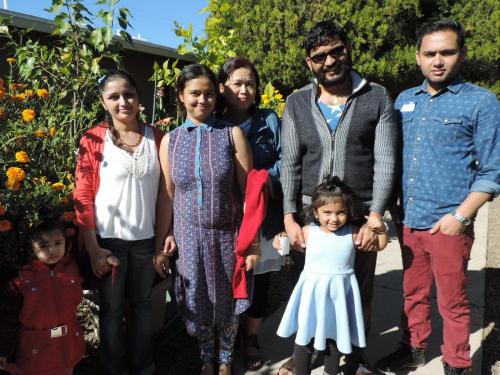
November 24, 2016 was my first Thanksgiving in the US since 2008. This holiday, although celebrated by a majority of people living in the US with family and friends, is also controversial. To some Native Americans and others this is a national day of mourning. A time to remember the genocide that was started by white Europeans when they came in large numbers to America. History, like opinions, is really a matter of perspective based on one’s life experiences; everybody has their own.
I’ve always been sensitive to having privilege in my life as I was born into a “white” middle class family in the US, somewhat limiting my life experiences. But I’ve been fortunate in that I’ve developed a social consciousness and a sense of social justice based on these experiences. I observe things that look unfair to me and I feel a sense of responsibility to do something about this and/or at minimum be aware.
This Thanksgiving I was not with my family as they live in California. I was invited by my friend Barbara Eiswerth of Iskashitaa Refugee Network to a Global Thanksgiving Potluck at Desert Courtyard Apartments where many of the former refugees and asylum seekers live. Iskashitaa is a grass-roots organization that helps rebuild the lives of United Nations refugees and asylum seekers. They do this through partnerships within the community and food-based programming. Iskashitaa empowers refugees by creating opportunities to use their knowledge and skills from their home countries to help their families become a part of the Tucson, Arizona community.
I decided that I would wear a topi and a vest from Assam, India as I don’t often get the opportunity to do this and felt that this would be acceptable. When I arrived a saw a number of people with Nepali topis and I immediately felt derai kuchi laagyo, especially when I was able to speak my limited Nepali. These people were Nepalese from Bhutan, some of whom had spent 18-22 years in one of approximately seven refugee camps in Nepal. There were also people from Democratic Republic of the Congo (DRC) who had been refugees in a camp in Tanzania. There were Syrians, Somalis, Eritreans, Gazans, Pakistanis and Darfurians all with their personal stories.
I spoke to a couple of young men, Tek and Hari who were Nepalese but whose ancestors had gone to Bhutan most likely in the late 1800s or as early as the 1600s due to a shortage of Bhutanese labor. In 1988 Bhutan's One Nation One People policy stipulated that only one language, Dzongkha, and one style of dress and social etiquette (driglam namza), that of the Buddhist Ngalong ruling class, was allowed. Ultimately the Nepalese ended up in refugee camps in Nepal and became people without a country.
However both Tek and Hari and their families seem to be doing very well and consider the US their home. Tek is married to Pabitra and they have a daughter. He obtained his BA bio-chemistry from the University of Arizona (U of A) and is now in Pharmacy School. Hari also obtained his BA from the U of A in computers and math. (His younger brother is now at the U of A working on the same degrees) Hari recounted growing up in the Morang Sanischara camp where his father had to buy vegetables from local village shops and then sell them back to refugees in the camp in order to make ends meet. This was necessary due to receiving only 5 kg of rice/person/15 days.
I also spoke with Hibaert, a Christian, who has four children and came to the US in August. He and his family had fled DRC due to ongoing conflict and ended up living in a camp in Tanzania for 20 years. He was also happy to be in the US where there are opportunities for his children and he didn’t have to worry about being killed.
Ron Holland of the St. Francis in the Foothills United Methodist Congregation helped to coordinate the potluck. (Catrina, the apartment manager, did the majority of the work buying ingredients for the residents to cook with). St. Francis has a number of “hunger and social justice ministries”. Ron is a retired hospice chaplain and is married to his husband. He volunteers on a local level, thinking globally and acting locally telling me that, “We are all one and have an obligation to take care of one another”.
My friend Barbara has an incredible passion for the work that she is doing through Iskashitaa. She told me, “We must give opportunity for all people to sit at the table with one another, especially for new Americans.”
As I left I thought to myself, this is the US that I know, one which welcomes everyone no matter who they are or what they believe. We help others especially those facing major difficulties in their lives. Ron told me about Haitian asylum seekers living in Mexico waiting to come to the US. Local churches were taking care of their current needs. But how long would it take for them to be able to enter this country if at all?
Mostly I wanted to talk and show what I experienced to the US President elect and to remind him how the Statue of Liberty greets people coming to the US:
Give me your tired, your poor,
Your huddled masses yearning to breathe free,
The wretched refuse of your teeming shore.
Send these, the homeless, tempest-tossed to me,
I lift my lamp beside the golden door!”
From Emma Lazarus’ sonnet, New Colossus, which she wrote for a fundraiser auction to raise money for the pedestal upon which the Statue of Liberty now sits.










Add new comment